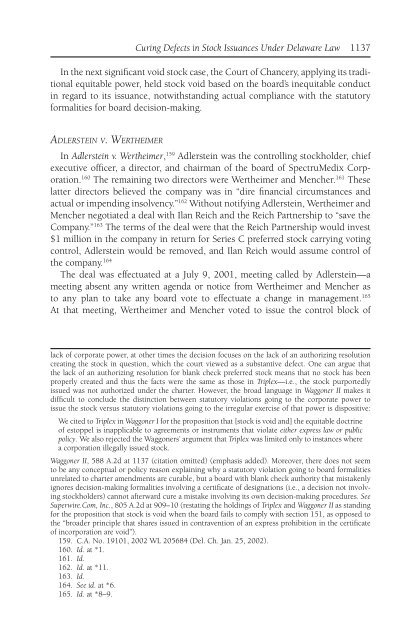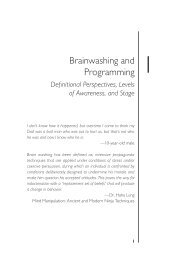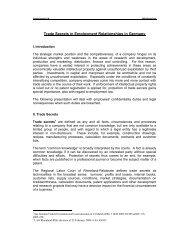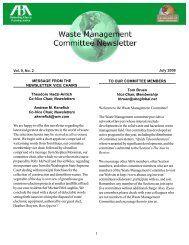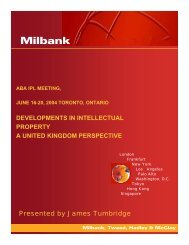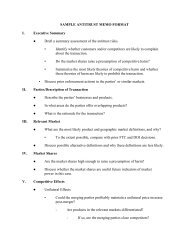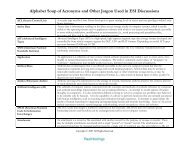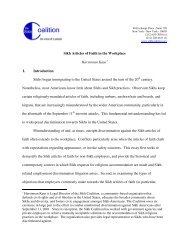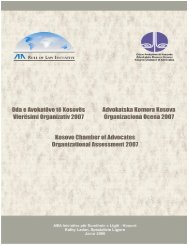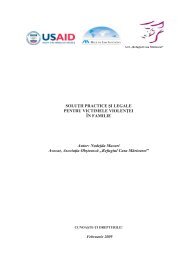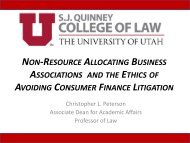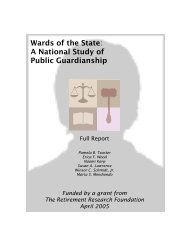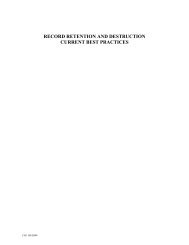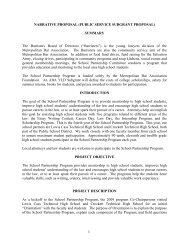Curing Defects in Stock Issuances - American Bar Association
Curing Defects in Stock Issuances - American Bar Association
Curing Defects in Stock Issuances - American Bar Association
Create successful ePaper yourself
Turn your PDF publications into a flip-book with our unique Google optimized e-Paper software.
<strong>Cur<strong>in</strong>g</strong> <strong>Defects</strong> <strong>in</strong> <strong>Stock</strong> <strong>Issuances</strong> Under Delaware Law 1137<br />
In the next signifi cant void stock case, the Court of Chancery, apply<strong>in</strong>g its traditional<br />
equitable power, held stock void based on the board’s <strong>in</strong>equitable conduct<br />
<strong>in</strong> regard to its issuance, notwithstand<strong>in</strong>g actual compliance with the statutory<br />
formalities for board decision-mak<strong>in</strong>g.<br />
ADLERSTEIN V. WERTHEIMER<br />
In Adlerste<strong>in</strong> v. Wertheimer, 159 Adlerste<strong>in</strong> was the controll<strong>in</strong>g stockholder, chief<br />
executive offi cer, a director, and chairman of the board of SpectruMedix Corporation.<br />
160 The rema<strong>in</strong><strong>in</strong>g two directors were Wertheimer and Mencher. 161 These<br />
latter directors believed the company was <strong>in</strong> “dire fi nancial circumstances and<br />
actual or impend<strong>in</strong>g <strong>in</strong>solvency.” 162 Without notify<strong>in</strong>g Adlerste<strong>in</strong>, Wertheimer and<br />
Mencher negotiated a deal with Ilan Reich and the Reich Partnership to “save the<br />
Company.” 163 The terms of the deal were that the Reich Partnership would <strong>in</strong>vest<br />
$1 million <strong>in</strong> the company <strong>in</strong> return for Series C preferred stock carry<strong>in</strong>g vot<strong>in</strong>g<br />
control, Adlerste<strong>in</strong> would be removed, and Ilan Reich would assume control of<br />
the company. 164<br />
The deal was effectuated at a July 9, 2001, meet<strong>in</strong>g called by Adlerste<strong>in</strong>—a<br />
meet<strong>in</strong>g absent any written agenda or notice from Wertheimer and Mencher as<br />
to any plan to take any board vote to effectuate a change <strong>in</strong> management. 165<br />
At that meet<strong>in</strong>g, Wertheimer and Mencher voted to issue the control block of<br />
lack of corporate power, at other times the decision focuses on the lack of an authoriz<strong>in</strong>g resolution<br />
creat<strong>in</strong>g the stock <strong>in</strong> question, which the court viewed as a substantive defect. One can argue that<br />
the lack of an authoriz<strong>in</strong>g resolution for blank check preferred stock means that no stock has been<br />
properly created and thus the facts were the same as those <strong>in</strong> Triplex—i.e., the stock purportedly<br />
issued was not authorized under the charter. However, the broad language <strong>in</strong> Waggoner II makes it<br />
diffi cult to conclude the dist<strong>in</strong>ction between statutory violations go<strong>in</strong>g to the corporate power to<br />
issue the stock versus statutory violations go<strong>in</strong>g to the irregular exercise of that power is dispositive:<br />
We cited to Triplex <strong>in</strong> Waggoner I for the proposition that [stock is void and] the equitable doctr<strong>in</strong>e<br />
of estoppel is <strong>in</strong>applicable to agreements or <strong>in</strong>struments that violate either express law or public<br />
policy. We also rejected the Waggoners’ argument that Triplex was limited only to <strong>in</strong>stances where<br />
a corporation illegally issued stock.<br />
Waggoner II, 588 A.2d at 1137 (citation omitted) (emphasis added). Moreover, there does not seem<br />
to be any conceptual or policy reason expla<strong>in</strong><strong>in</strong>g why a statutory violation go<strong>in</strong>g to board formalities<br />
unrelated to charter amendments are curable, but a board with blank check authority that mistakenly<br />
ignores decision-mak<strong>in</strong>g formalities <strong>in</strong>volv<strong>in</strong>g a certifi cate of designations (i.e., a decision not <strong>in</strong>volv<strong>in</strong>g<br />
stockholders) cannot afterward cure a mistake <strong>in</strong>volv<strong>in</strong>g its own decision-mak<strong>in</strong>g procedures. See<br />
Superwire.Com, Inc., 805 A.2d at 909–10 (restat<strong>in</strong>g the hold<strong>in</strong>gs of Triplex and Waggoner II as stand<strong>in</strong>g<br />
for the proposition that stock is void when the board fails to comply with section 151, as opposed to<br />
the “broader pr<strong>in</strong>ciple that shares issued <strong>in</strong> contravention of an express prohibition <strong>in</strong> the certifi cate<br />
of <strong>in</strong>corporation are void”).<br />
159. C.A. No. 19101, 2002 WL 205684 (Del. Ch. Jan. 25, 2002).<br />
160. Id. at *1.<br />
161. Id.<br />
162. Id. at *11.<br />
163. Id.<br />
164. See id. at *6.<br />
165. Id. at *8–9.


